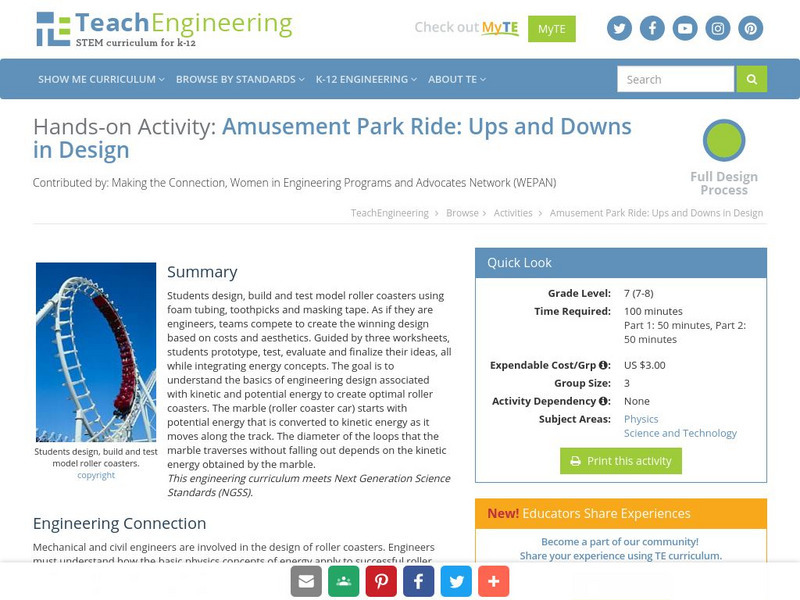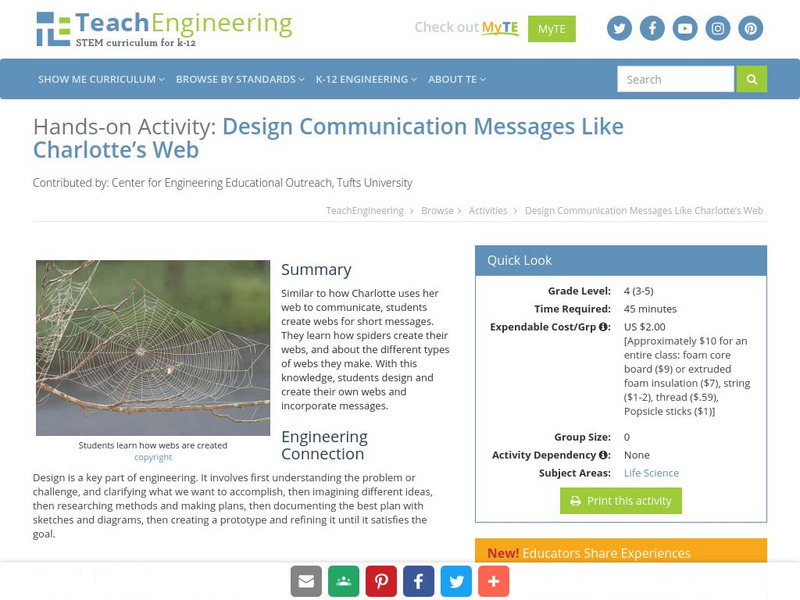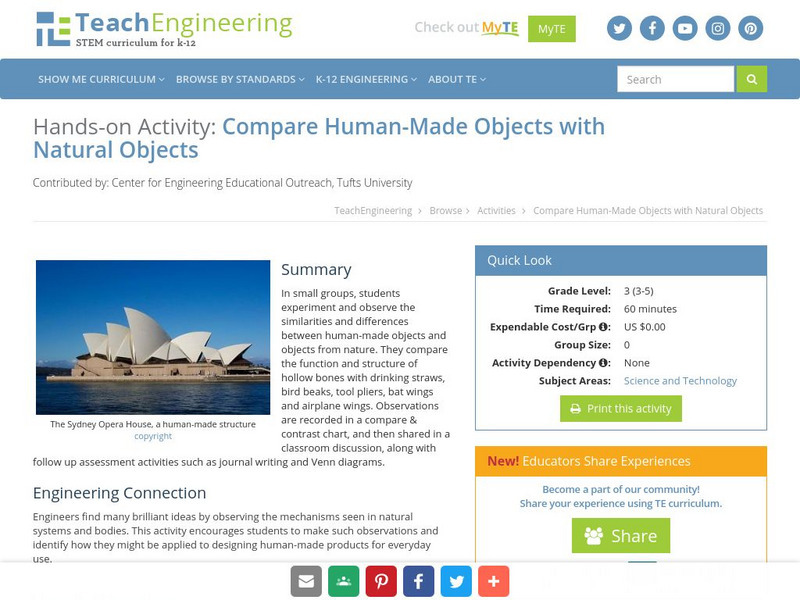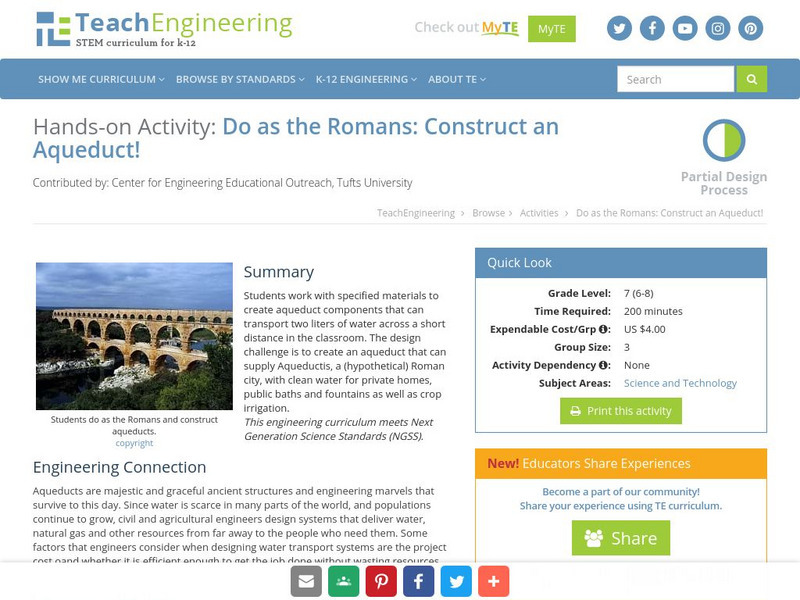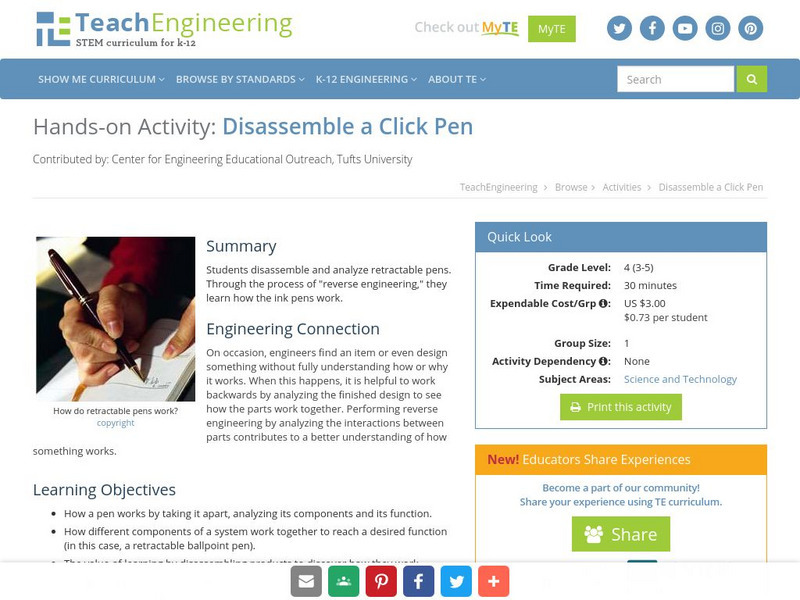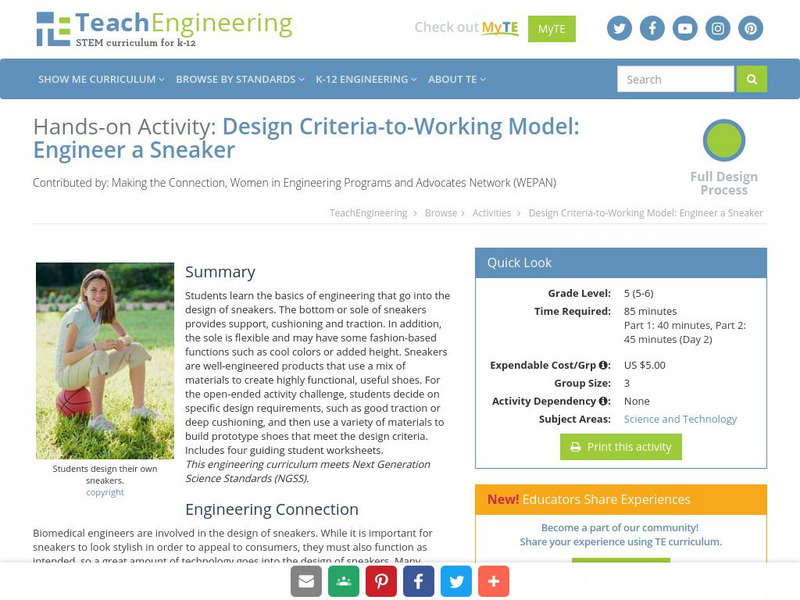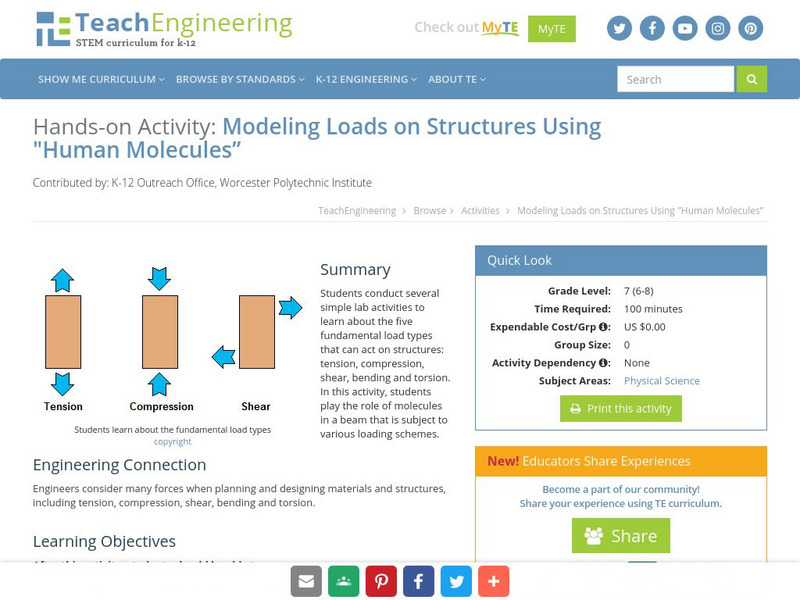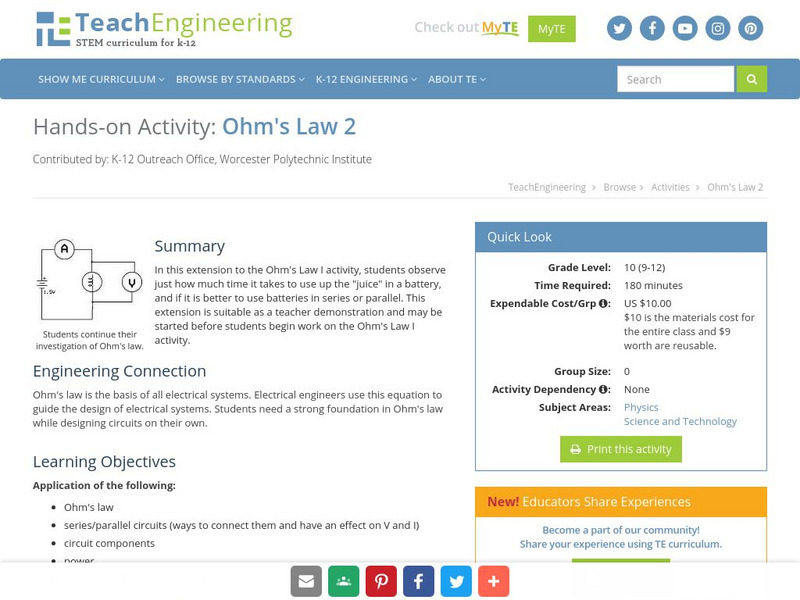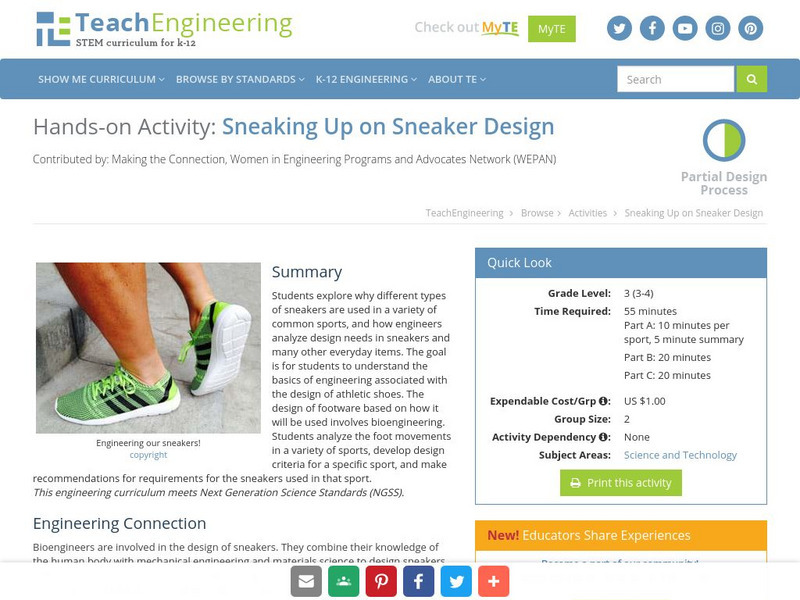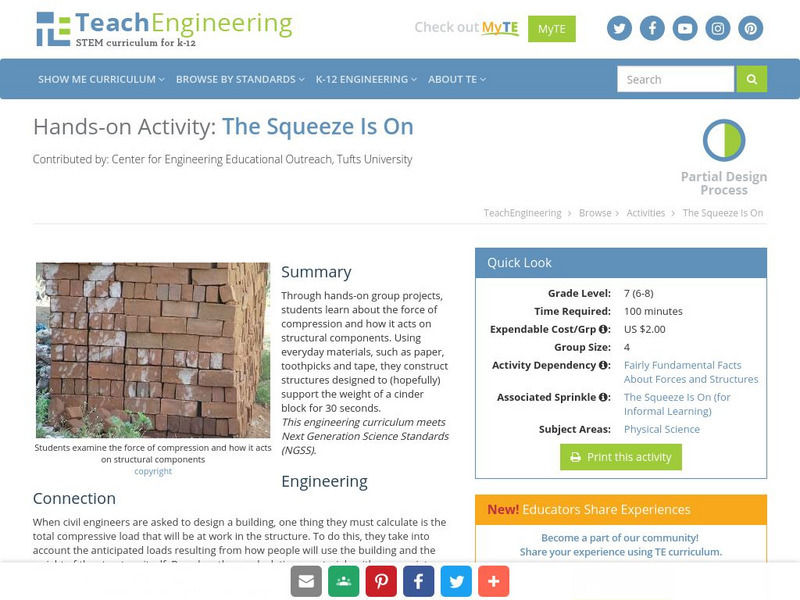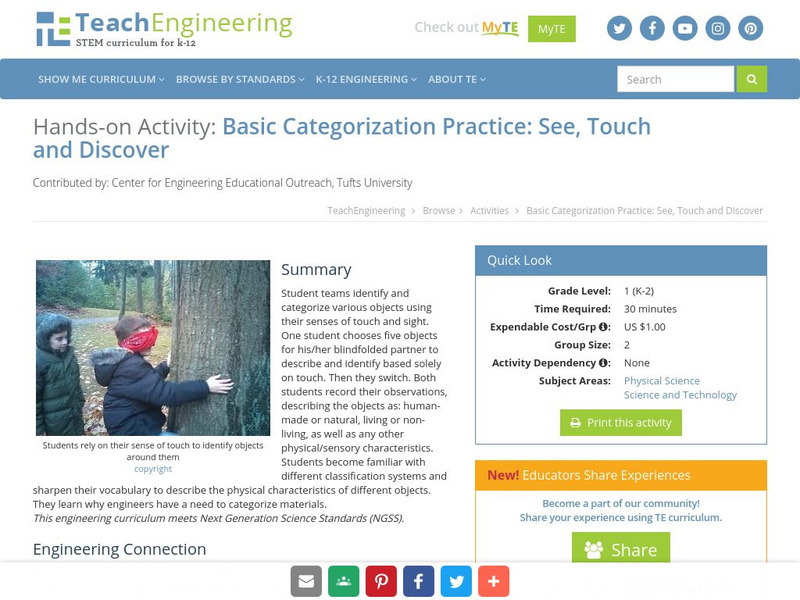TeachEngineering
Teach Engineering: Journey to the Afterlife
In groups of four, have students design an Egyptian funerary barge to transport the mummy through the underworld to the afterlife. The design of the boat is extremely critical in order for the mummy to have a chance to reach and enter...
TeachEngineering
Teach Engineering: Amusement Park Ride: Ups and Downs in Design
This unit has students design and build foam tubing roller coasters. The design process integrates energy concepts as they test and evaluate their designs that address the task as an engineer would. The goal is for students to understand...
TeachEngineering
Teach Engineering: Ball Bounce Experiment
Many of today's popular sports are based around the use of a ball, yet none are completely alike. In fact they are all designed with specific characteristics in mind. Students will investigate different balls' abilities to bounce and...
TeachEngineering
Teach Engineering: Charlotte's Web
As Charlotte uses her web to communicate, the students will also create a web to send a small message. The students will learn how a spider creates its web, and about the different types of webs spiders make. With this knowledge, the...
TeachEngineering
Teach Engineering: Do Different Colors Absorb Heat Better?
Students test whether the color of a material affects how much heat it absorbs. Students will place an ice cube in a box made of colored paper (one box per color; white, yellow, red and black), which they will place in the sun. The...
TeachEngineering
Teach Engineering: Compare Fabric Materials
Students will look at different types of fabric and their respective individual properties. Using a magnifying glass and sandpaper they will test and observe the weave of fabrics and the wear quality of sample fabrics. By comparing the...
TeachEngineering
Teach Engineering: Compare Human Made Objects With Natural Objects
In small groups, students will experiment and observe the similarities and differences between human-made objects and nature. The students will compare the function and structure of hollow bones with drinking straws, bird beaks, tool...
TeachEngineering
Teach Engineering: Do as the Romans: Construct an Aqueduct!
In this activity, students work with specified materials to create aqueduct components that will transport 2 liters of water across a short distance in their classroom. The goal is to build an aqueduct that will supply Aqueductis, a...
TeachEngineering
Teach Engineering: Design a Parachute
After a discussion about what a parachute is and how it works, students will create a parachute using different materials that they think will work best. The students will test their designs, which will be followed by a class discussion...
TeachEngineering
Teach Engineering: Design a Recycling Game!
Students will design a game where players try to come up with alternative uses for used products. Students will brainstorm ideas for an effective board game format.
TeachEngineering
Teach Engineering: Disassemble a Click Pen
In this activity students will disassemble and analyze a click pen. By performing such reverse engineering by analyzing the interactions between parts, students gain a better understanding of how this every day item works
TeachEngineering
Teach Engineering: Engineer a Sneaker
The goal is for students to understand the basics of engineering that go into the design of a sneaker. The bottom or sole of a sneaker provides support, cushioning, and traction. In addition the sole is flexible and can have some fashion...
TeachEngineering
Teach Engineering: Forces on the Human Molecule
Students will conduct several simple lab activities to learn about the five fundamental load types that can act on structures: tension, compression, shear, bending, and torsion. In this activity, students will play the role of molecules...
TeachEngineering
Teach Engineering: An Arm and a Leg
Students will design and build a prototype of an artificial limb using a simple syringe system as an introduction to bioengineering. Students will determine which substance water (liquid) or air (gas) will make the appendage more efficient.
TeachEngineering
Teach Engineering: Make an Alarm!
After reading the story "Dear Mr. Henshaw" by Beverly Cleary, students will build an alarm system for something in the classroom, as the main character Leigh does to protect his lunchbox from thieves. Students will learn about alarms and...
TeachEngineering
Teach Engineering: Ohm's Law 2
This extension to the Ohm's Law I activity, students will observe just how much time it takes to use up the "juice" in a battery, and if it is better to use batteries in series or parallel.
TeachEngineering
Teach Engineering: Making Decisions: Packaging and the Environment
This activity has students redesign and justify the packaging currently used in some consumer products. Design criteria include reducing the amount of packaging material by 25%.
TeachEngineering
Teach Engineering: Design Your Own Rube Goldberg Machine
Rube Goldberg is famous for his very complex machines that accomplish everyday tasks. Students will design and build a Rube Goldberg machine that will accomplish a simple task in no less than ten steps.
TeachEngineering
Teach Engineering: Silly Semi Solids
Groups of students make a polymer out of household items. They then experiment with the polymer to determine its various properties.
TeachEngineering
Teach Engineering: Sneaking Up on Sneakers
This activity explores why different types of sneakers are used in a variety of common sports. It connects how engineers analyze design needs in sneakers and everyday items. The goal is for students to understand the basics of...
TeachEngineering
Teach Engineering: Space Shelter
The invasion has taken place and we need to find a new home. To ensure your survival beyond earth's occupation you must design a shelter that can be built on another planet. Students will research the characteristics of a planet of their...
TeachEngineering
Teach Engineering: The Squeeze Is On
Students will learn about the force of compression and how it acts on structural components through a hands-on group project. Using everyday products such as paper, toothpicks, and tape they will construct a structure that will support...
TeachEngineering
Teach Engineering: Testing Fundamental Loads
Students will conduct several simple lab activities to learn about the five fundamental load types that can act on structures: tension, compression, shear, bending, and torsion. In this activity, students break foam insulation blocks by...
TeachEngineering
Teach Engineering: Touch and Discover
Students work in pairs or small groups to identify and categorize various objects. One student is blindfolded and the other student chooses five objects for their partner to identify. The blindfolded student has to describe and try to...



